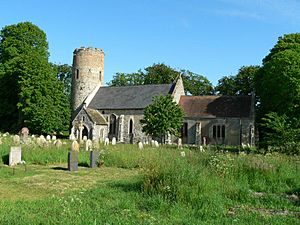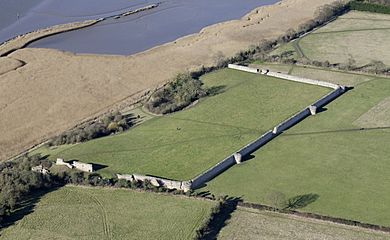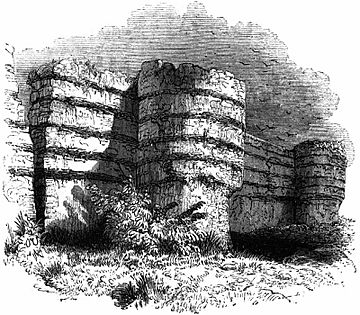Burgh Castle facts for kids
Quick facts for kids Burgh Castle |
|
|---|---|
 Church of St Peter and St Paul |
|
| Area | 6.76 km2 (2.61 sq mi) |
| Population | 1,150 (2011) |
| • Density | 170/km2 (440/sq mi) |
| OS grid reference | TG476049 |
| Civil parish |
|
| District |
|
| Shire county | |
| Region | |
| Country | England |
| Sovereign state | United Kingdom |
| Post town | GREAT YARMOUTH |
| Postcode district | NR31 |
| Police | Norfolk |
| Fire | Norfolk |
| Ambulance | East of England |
| EU Parliament | East of England |
Burgh Castle is a small village in Norfolk, England. It sits on the east side of the River Waveney. The village is about 3.7 miles (6 km) west of Great Yarmouth. Burgh Castle is also part of the Broads, an area famous for its rivers and lakes. Until 1974, Burgh Castle was actually part of Suffolk county.
Contents
Exploring Burgh Castle's Past
Burgh Castle has a very long history. People likely lived here even in the Neolithic period. This was a time thousands of years ago when early humans used stone tools. Many flint and bronze axe-heads have been found in the area. This shows that ancient communities lived and worked here.
The Roman Fort at Burgh Castle
A very important part of Burgh Castle's history is its Roman fort. This fort was built around the third century AD. It was part of a special defense system called the Saxon Shore. This system protected the East Anglian coast from attacks. These attacks came from groups like the Anglo-Saxons.
Today, the fort site is looked after by the Norfolk Archaeological Trust. It is open to everyone for free. You can visit and explore the ancient Roman walls.
Early Christian Connections
Some historians, like Elizabethan writer William Camden, believe Burgh Castle was once home to Cnobheresburg. This was an early Irish monastery. It was founded by Saint Fursey in the seventh century. This monastery was part of a mission to spread Christianity. It was an important place for early Christian faith in southern England.
Burgh Castle in the Domesday Book
In 1086, a famous survey called the Domesday Book was created. This book recorded details about England after the Norman Conquest. The Domesday Book shows that Burgh Castle had 15 households. These households belonged to a person named "Ralph the Bowman." This gives us a snapshot of village life almost a thousand years ago.
St Peter and St Paul's Church
Burgh Castle has a historic church called St Peter and St Paul's Church. It has Anglo-Saxon origins, meaning it was first built a very long time ago. The church is dedicated to Saint Peter and Saint Paul. It is one of only 124 round-tower churches left in Norfolk. These churches have unique circular towers.
Most of the church building you see today was built in the 13th and 15th centuries. However, it also includes many old Roman bricks. These bricks were probably taken from the nearby Roman fort. The church has been a Grade II* listed building since 1954. This means it is a very important historic building.
See also
 In Spanish: Burgh Castle (pueblo) para niños
In Spanish: Burgh Castle (pueblo) para niños
 | John T. Biggers |
 | Thomas Blackshear |
 | Mark Bradford |
 | Beverly Buchanan |




